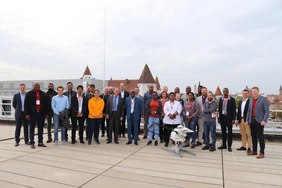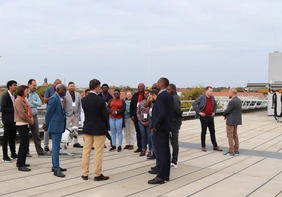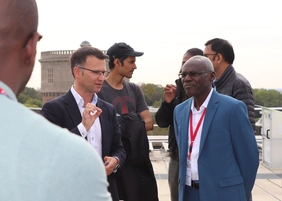Namibia in the southwest of the African continent has two extremely important energy resources: lots of sun and lots of wind.
And it is precisely these resources that are essential for the production of green hydrogen, which is considered a key element for the energy transition in industry, aviation and shipping. In global terms, Namibia is one of the countries where hydrogen can be optimally produced.
Commissioned by the Bavarian Ministry of Economic Affairs and organised by the Bildungswerk der Bayerischen Wirtschaft (bbW), a transnational exchange took place last week. Twelve guests from Namibia visited Bavaria to exchange ideas on the topic of hydrogen and to learn from each other. We were also able to welcome the African colleagues from research, business and education at the THI.
It was an interesting morning with presentations by Prof. Samuel John from the Namibia University of Science and Technology, Prof. Sergej Diel - Head of the Master's programme in Hydrogen Technology and Economics at the THI and Dr. Christoph Trinkl - Institute Director at the Institute for New Energy Systems (InES). The exchange of ideas was rounded off by a trip to the renewable energy plants on the university roof, with laboratory tours and a joint lunch.
The contacts of the InES to Africa and Namibia have existed for a very long time. The THI institute specialised in cooperation with scientific institutions and companies in Africa many years ago. For despite the abundant solar, wind and biomass resources, large parts of the population in the rural areas of African countries have no access to electricity. This is where the team comes in and promotes the use of energy systems based on renewable energies with its research.
Since the winter semester 22/23, the Faculty of Mechanical Engineering has been offering a Master's programme in Hydrogen Technology and Economics, the only one of its kind in Germany, which started at the beginning of October for the third time with great demand. Find out more at: www.thi.de/maschinenbau/studiengaenge/wasserstofftechnologie-meng/





![[Translate to English:] Logo Akkreditierungsrat: Systemakkreditiert](/fileadmin/_processed_/2/8/csm_AR-Siegel_Systemakkreditierung_bc4ea3377d.webp)








![[Translate to English:] Logo IHK Ausbildungsbetrieb 2023](/fileadmin/_processed_/6/0/csm_IHK_Ausbildungsbetrieb_digital_2023_6850f47537.webp)


